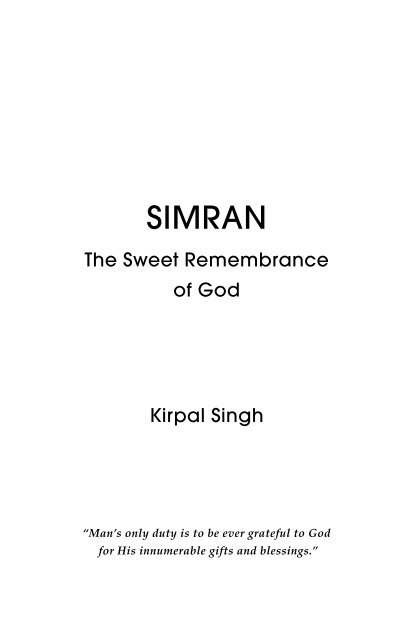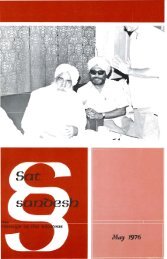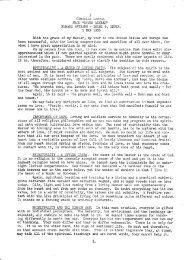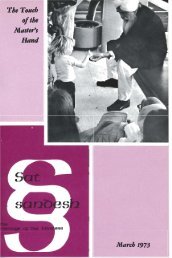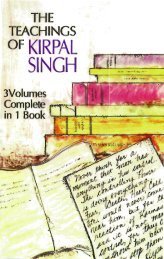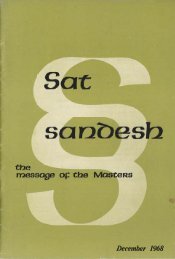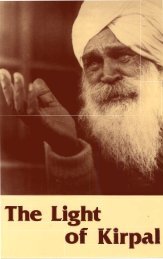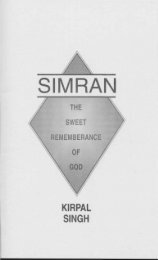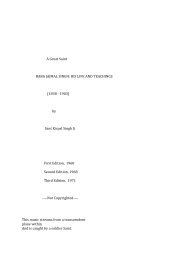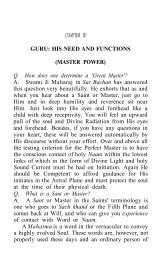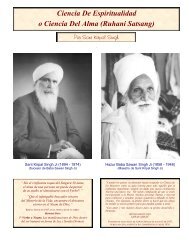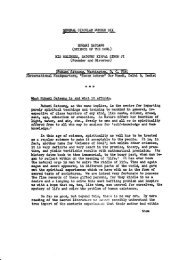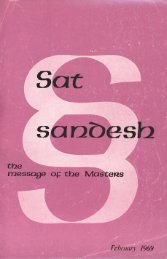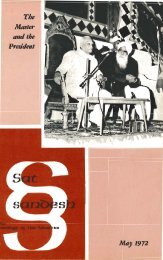2010 PDF edition - Ruhani Satsang USA
2010 PDF edition - Ruhani Satsang USA
2010 PDF edition - Ruhani Satsang USA
- No tags were found...
Create successful ePaper yourself
Turn your PDF publications into a flip-book with our unique Google optimized e-Paper software.
SIMRAN<br />
The Sweet Remembrance<br />
of God<br />
Kirpal Singh<br />
“Man’s only duty is to be ever grateful to God<br />
for His innumerable gifts and blessings.”<br />
i
I have written books without any copyright—no rights<br />
reserved—because it is a Gift of God, given by God,<br />
as much as sunlight; other gifts of God are also free.<br />
—from a talk by Kirpal Singh, with the author of a<br />
book after a talk to students of religion at Santa Clara<br />
University, San Jose, California on November 16,<br />
1972.<br />
The text of this book is the same as what was published<br />
during the lifetime of Master Kirpal Singh. Aside<br />
from punctuation and capitalization corrections, no<br />
changes have been made to the text; it is exactly the<br />
same as what was approved by Master Kirpal Singh.<br />
First Edition, February 1954<br />
Second Edition, May 1967<br />
Third Edition, July 1971<br />
This Edition published in <strong>2010</strong><br />
RUHANI SATSANG ®<br />
DIVINE SCIENCE OF THE SOUL<br />
250 “H” Street, #50<br />
Blaine, WA 98230-4018 <strong>USA</strong><br />
www.<strong>Ruhani</strong><strong>Satsang</strong><strong>USA</strong>.org<br />
Tel: 1 (888) 530-1555<br />
ISBN # 978-0-942735-08-6<br />
SAN 854-1906<br />
Printed in the United States of America<br />
by Print Graphics Pros • (949) 859-3845<br />
ii
Sant Kirpal Singh Ji<br />
(1894-1974)<br />
iii
Dedicated<br />
to the Almighty God<br />
working through all Masters who have come<br />
and Baba Sawan Singh Ji Maharaj<br />
at whose lotus feet<br />
the writer imbibed sweet elixir of<br />
Holy Naam — the Word<br />
iv
Sawan Singh Ji Maharaj<br />
v
Sant Kirpal Singh passed on from this earth in 1974.<br />
Therefore, He is no longer taking on new people to<br />
guide out of this world and back to God. He left many<br />
books that explain, as much as can be conferrred in<br />
a worldly language, the meaning of life. The books<br />
and the <strong>Ruhani</strong> <strong>Satsang</strong> website http://www.<strong>Ruhani</strong><br />
<strong>Satsang</strong><strong>USA</strong>.org/ are maintained to help stir an interest<br />
in God and to help people know what to look for<br />
in their search for the way back home.<br />
When asked about a successor, we can only offer this<br />
quotation from the Master:<br />
Today there is a great awakening beginning.<br />
Some have got the answer, some have not, but<br />
the search to solve the mystery of life has been<br />
born all over the world. The day that question<br />
arises in the mind is the greatest day of one’s<br />
life, for once it is born, it does not succumb<br />
until it is satisfied.<br />
So, make your life an example of the teachings<br />
you follow — live up to them.<br />
If you have a strong desire to get it, then God<br />
Himself will make the arrangements for you.<br />
[Excerpts from a talk published in the January 1971<br />
issue of Sat Sandesh]<br />
vi
Contents<br />
Introduction.................................................. 1<br />
Simran........................................................ 12<br />
The Seat of Simran................................ 16<br />
The Basic Names of God....................... 17<br />
How to Do Simran................................. 20<br />
Kabir on Simran.................................... 24<br />
Conclusion.................................................. 38<br />
List of Books by Kirpal Singh..................... 45<br />
vii
Truth is higher than everything but<br />
higher still is true living. Truth and true<br />
living are not exclusive of each other but<br />
go together; one supplements the other<br />
and their combination forms the God-like<br />
life. One who practices true living will<br />
always earn his living by the sweat of his<br />
brow and feed himself and his family on<br />
rightly procured foods consisting of fruits,<br />
vegetables, nuts, cereals and permitted<br />
dairy products. Furthermore, he will be<br />
honest and aboveboard in his dealings<br />
with others.<br />
viii
INTRODUCTION<br />
Dear Brothers and Sisters:<br />
Mr. Khanna has asked me to give some message<br />
on my birthday anniversary. The day of my physical<br />
birth fell on the 6th of February, 1894. The true date<br />
of my birth is the day when I sat physically at the<br />
holy feet of my Master SAWAN SINGH, in February<br />
1924. Still the truer date is when I was reborn anew<br />
into the beyond and met my Master in all His glory<br />
in 1917, i.e., seven years before my meeting with<br />
Him physically. I respect all holy scriptures of all the<br />
Saints who came in the past as all those were given<br />
by inspiration of God. I had the good fortune to sit<br />
at the feet of my Master. That which I have received<br />
of my Master, the same I deliver unto you. I find<br />
the same parallel with what all the past Saints have<br />
said. The difference is in the language or the way of<br />
expression, but the subject matter is the same. They<br />
all talk as to how to liberate our souls from mind and<br />
matter and know ourselves and know God. At the<br />
time of Initiation, Satguru resides with the devotee.<br />
He is with you always even unto the end of the world<br />
and will be extending all feasible help. He will never<br />
1
leave thee, nor forsake thee. Whosoever’s mind is<br />
stayed on Him with full faith, He will keep him in<br />
perfect peace. There is hope for everybody. Master<br />
Power comes into the world to save sinners and to put<br />
them on the way back to God. It is for you to remain<br />
devoted to Him and keep His commandments. The<br />
rest is for Him to do. God is Love. You are also love.<br />
Love is the potent factor to meet God. He that loveth<br />
not, knoweth not God. Therefore, thou shalt love the<br />
Lord thy God with all thy heart and with all thy soul<br />
and with all thy mind. I wish you to be the doers of the<br />
Word and not hearers only, for an ounce of practice is<br />
worth more than tons of theories. Reformers are badly<br />
needed, not of others, but of themselves. You shall<br />
have Godhead as salary. I wish you all Godspeed in<br />
your efforts to tread the way back to God, which lies<br />
within you. My love and best wishes are always with<br />
you and will remain with you. The mystery of life is<br />
solved in the company of those who have solved that<br />
for themselves. How to find such a man? One who<br />
solved this mystery can help you in finding the same<br />
truth.<br />
Someone questioned Guru Nanak as to how one<br />
could find a true and real Guru, and by what signs<br />
He could be recognized. Guru Nanak replied: “The<br />
human body is a temple of God, and it is by turning<br />
within that we meet God. There is a way from this<br />
house of the body to another house within (the Nij<br />
Ghar or Sach Khand) which is the Real House and here<br />
the soul finds everlasting peace. The human body is<br />
just like a rented house, given to us temporarily (i.e.,<br />
2
allotted span of life) until, in the meanwhile, the soul<br />
is wise enough to gain access to her permanent abode<br />
of everlasting bliss. Now, the Real and True Master<br />
is one who can show us the way out to the Kingdom<br />
of God within this body and can lead the soul from<br />
stage to stage until the kingdom is gained and the soul<br />
comes into her own.”<br />
The human body, like any other physical thing, is<br />
subject to decay and disintegration. Even this world<br />
suffers dissolution. But Sach Khand or the Kingdom<br />
of God alone is indestructible and eternal. The process<br />
of Dissolution works up to the realm of the Triloki<br />
or three worlds (physical, astral and causal planes)<br />
and that of Grand Dissolution up to the subtlest of<br />
the causal planes; but it cannot reach Sach Khand,<br />
or Sat Lok, or Mukam-i-Haq as the Mohammedans<br />
call it (New Jerusalem of the Christians), for it is the<br />
veritable Kingdom of God, as spoken of by Christ.<br />
The Saints have, therefore, set Sach Khand as their<br />
goal, which is beyond the ken of Dissolution and<br />
Grand Dissolution.<br />
Next, the Satguru or the True Master points out<br />
the way to the Kingdom of God. He tells us that the<br />
Divine Music comprised of five strains or melodies<br />
is always going on in the body. This continuous<br />
symphony is the connecting link between the Creation<br />
and the Creator. It is the ladder which the soul<br />
has to climb step by step in its onward journey to<br />
the Kingdom of God. This Music is most melodious,<br />
the like of which cannot be found on Earth. It has<br />
immense attraction and an irresistible appeal in it. The<br />
3
different melodies begin from Sahas dal Kanwal (the<br />
region of the thousand petaled lotus) and reach as far<br />
as Sach Khand. The Master Soul gives a contact to the<br />
human soul at the lowest end of the Musical notes,<br />
besides some experience of the withdrawal of the<br />
sensory current from the body, both of which have<br />
to be developed by daily practice.<br />
The Satguru comes into the world with the treasure<br />
of Naam. The Muslims call it the Nada-i-Asmani<br />
(heavenly music) and Christians describe it as “Word.”<br />
The treasure of Naam is not the heritage of this or that<br />
particular nation or community, nor of any particular<br />
country, nor of any religion, caste, or creed. Again,<br />
this treasure is freely distributed by a Master Soul to<br />
all, irrespective of any of the above considerations.<br />
An aspirant may be a Brahmin or Kshatriya, a Hindu<br />
or a Muslim, or anything else, for that is not of any<br />
consequence. Each one of us can learn The Art of<br />
Life and The Science of Spirituality so as to find a<br />
way out to the Kingdom of God which is the common<br />
heritage of all and the summum bonum of life.<br />
Again, a Master Soul may come into the world in<br />
any garb He may choose. It is of no consequence to<br />
the aspirants for spirituality. Any such considerations<br />
will surely be a hindrance and a positive disadvantage.<br />
Our only connection with the Master Soul is purely of<br />
a spiritual nature and not a temporal one. Saint Kabir,<br />
though a Muslim weaver, had among His followers<br />
Rajput chieftains like Bir Singh and Bhaghail Singh.<br />
Similarly Saint Ravi Das, a cobbler by profession,<br />
had Mira Bai, a Rajput princess, and Raja Pipa in His<br />
4
sacred fold. All that we have to ascertain is that the<br />
Master is Shabda Sanehi. He who loves the Word is<br />
Word personified and can give us first hand experience<br />
of the Shabd or the Sound Principle to start with.<br />
If He satisfies these conditions, we should have no<br />
scruples on any ground whatsoever in accepting Him<br />
and learning from Him the Science of Spirituality.<br />
The macrocosm is in the microcosm. The human<br />
body is the prototype of the universe and much more<br />
than that. In it there are millions of solar systems with<br />
their suns, moons, and earths revolving in and out.<br />
The sweetest of the sweet music is also going on in<br />
it, emanating from the true throne of the True King<br />
— God.<br />
A Muslim divine also says in this respect: “When<br />
I heard the bewitching strains of that celestial song,<br />
Kaaba (the holiest of the holy places of Muslim worship)<br />
and the temple (of the idol worshippers) both<br />
appeared to be bad caricatures before the divine<br />
intoxication it gave.”<br />
Maulana Rumi says: “The Saints are the True<br />
Devotees of God, always listening to the Divine Music<br />
within. That infuses life into the lovers of God.”<br />
Shamas Tabriz, another Muslim Saint, also speaks of<br />
it: “Every moment a strange type of call is coming<br />
from the Heaven. I hear that voice and none else.<br />
Blessed indeed are they who hear this call.”<br />
This song is quite unique in character. No language<br />
can describe it — neither Turkish, nor Arabic,<br />
5
nor Persian, nor any other. It is, in fact, an Unspoken<br />
Language and an Unwritten Law unto itself.<br />
The Prophet Mohammed once declared that He<br />
listened to the Voice of God just as He listened to any<br />
other voice. But when questioned as to why it could<br />
not be heard by others, He said, ‘”You cannot hear<br />
this Voice as your ears have been sealed up. Hie to<br />
some Master Soul with a prayer for breaking of the<br />
seal and then listen attentively in the silence of your<br />
heart.”<br />
Mrs. Annie Besant, the great Theosophist, calls<br />
it the Voice of the Silence and says that the Silence<br />
becomes vocal when the mind is at perfect rest.<br />
“The Kingdom of God is within you,” says Christ.<br />
The trouble is that we search for it without and find<br />
it not. Man in his search for God has not spared any<br />
efforts. He has looked for Him in the sacred rivers<br />
(like Ganges, etc.), in the snow-capped mountains<br />
of Badrinath, Kailash, Amarnath, etc., in the deep<br />
recesses of the forests, and in the sacred places of all<br />
antiquity, but with no success. As the “way out” to<br />
God lies within, you will have to find a Master who<br />
knows the Way and would be a guide unto you until<br />
the goal is reached. This work only a True Master can<br />
do and no one else can do it.<br />
Now the question comes: Where can this Divine<br />
Music be contacted? To this the Master replies, “This<br />
Divine Music is going on in Sukhmana (a central cord<br />
between Ida and Pingala, the two cords on either side,<br />
6
which running through the spine and passing through<br />
the center of and between the two eyebrows, reaches<br />
directly as far as Sach Khand or Shah Rag as named<br />
by the Muslims). It can be experienced by the soul in<br />
her deepest depths, when layer by layer the various<br />
sheaths or coverings (physical or gross, mental or<br />
subtle, and causal) are shaken off from the soul in<br />
her onward journey to the various Lokas or regions:<br />
the sun, the moon, the stars, of spirits (Pithrian),<br />
of Deities (Devian), etc. At each stage, the Music<br />
becomes more enrapturing than before, until in Par<br />
Brahm (beyond the three Lokas) the soul becomes<br />
self-luminous in her pristine glory; then the Music,<br />
too, becomes exceedingly charming, in full swell<br />
with unending continuity. This is the Ajapa Jap going<br />
on at all times in an Unspoken Language. As the<br />
soul hears it she gets magnetized, with the result that<br />
the mind with its outgoing faculties is paralyzed for<br />
want of the inspiration it is used to drawing from<br />
the Spirit, and gradually it loses its hold of her. The<br />
high-born maiden (being a drop of the ocean of Sat<br />
Nam) is freed from its clutches and now moves on<br />
unhampered.”<br />
It is, of course, impossible to describe the sublime<br />
symphonies in so many words, as they are past description<br />
for want of adequate expression.<br />
At present every soul has, on account of constant<br />
association with mind, acquired a tendency to flow<br />
downward and outward through the outgoing faculties.<br />
It is because of this that she cannot catch the<br />
Sound Current (the Elixir of Life) within. A cup turned<br />
7
upside down may for ages remain in the rain, but<br />
not a drop will fall into it. But if it is turned aright,<br />
it will get filled up in one or two showers. Exactly<br />
is it the case with the soul. As soon as the Master<br />
Soul gives her a contact with the life-giving Sound<br />
Current, by turning it aright through the withdrawal<br />
of the sensory current, the lotus-like cup of the spirit<br />
gets more and more water of Immortality until she<br />
gets drenched through and through and is saved forever.<br />
Mind, you know, is ever after pleasures of one<br />
kind or another. But the pleasures of this world are all<br />
transitory and have always some sting at the bottom.<br />
“Our sincerest laughter with some pain is fraught,”<br />
says an English poet.<br />
This renegade of the mind can only be subdued<br />
if some internal pleasure of rapturous strains of the<br />
Divine Music — the Word — is given to it in lieu of<br />
the external one. When mind tastes the sweet Elixir,<br />
it is diverted from the worldly enjoyments and is subdued.<br />
The soul becomes free. This is the only remedy<br />
by which the sages controlled the mind. It held good<br />
in all ages — the Golden, the Silver and the Copper,<br />
and holds good even today in Kali Yuga or the Iron<br />
Age. The Sat is eternal. It was in the beginning. It was<br />
in the middle, and it shall ever remain until Eternity.<br />
The Divine Music of Sat is then the sovereign remedy<br />
for stilling the mind. In due course of time, by regular<br />
practice, the soul becomes fully absorbed into the<br />
Elixir of Naam, and the mind is rendered absolutely<br />
ineffectual.<br />
8
As said above, the Sound Current begins from<br />
Turya Pad when, the sensory current having withdrawn<br />
from the body, the soul enters into the Beyond. The<br />
five strains in seriatim follow one another from one<br />
spiritual plane to another until Sach Khand is reached.<br />
One has to take hold of each of these strains or<br />
melodies for traversing from stage to stage until the<br />
final stage is attained. It is only here that salvation of<br />
the soul is assured and the cycle of births and deaths<br />
ends. This is the grand purpose of life, which one<br />
fulfills through the grace of the Master Soul.<br />
The Master Saint Shamas Tabriz says: “The Great<br />
God has turned us out and closed strongly the door<br />
behind the eyes. He Himself comes to us in the garb<br />
of a man to take us back into His fold.”<br />
The method by which He lets us in once again is<br />
explained further:<br />
First one has to withdraw into the silence of the<br />
soul, before he begins to hear the five strains<br />
of Music. The sensory current is to be withdrawn<br />
at the seat of the soul behind the eyebrows. The<br />
journey onward begins from this stage, the seventh<br />
in the order from below. When the soul rises above<br />
the six chakras or ganglions in the Pind or physical<br />
body and starts toward Sahans dal Kanwal (thousand<br />
petaled lotus), the seventh stage, she catches<br />
the first of the five strains of the Divine Music and<br />
proceeds further. There is no Naam in the lower six<br />
chakras. These, in fact, are the grave, from which<br />
9
we have to rise above and come to the point from<br />
where the Grand Trunk Road of Spirituality begins.<br />
Another Saint says, “At the seventh stage you<br />
begin to hear the five strains of the Divine Music, when<br />
you remove the tent of the soul from the graveyard<br />
of the body comprising the six lower chakras. From<br />
here heavenly Music takes charge of the soul and pulls<br />
it up from stage to stage until the final consummation<br />
with Sat Purush or Sat Naam takes place.”<br />
Almost all the Saints have given the same qualifications<br />
of a True Master. Guru Arjan says, “Accept<br />
that man as a Guru who can give you an experience<br />
of the Truth, the Naam. That is indescribable, no<br />
doubt, but we must have some contact thereof.” In<br />
short, whoever can tune us into the Shabd — the Divine<br />
Music. Kabir also speaks in the same terms: “We have<br />
so many sadhus, the great ones. I have respect for<br />
all of them. But the one who is One with the Word,<br />
and can give us a contact with that, He overtops all;<br />
and I have the greatest regard for Him.” Swami Shiv<br />
Dayal Singh Ji also speaks in the same way: “Guru<br />
is He who has love of Shabd and practices no other<br />
methods except that. Whoever practices Shabd is the<br />
perfect Guru. You sit at His feet, who will give you<br />
a contact with it.” He who is Word Personified, who<br />
was Word made flesh and dwelt amongst us, and can<br />
give us a contact with that, is held in high esteem by<br />
all Saints. The Holy Scriptures all speak in volumes<br />
of their greatness.<br />
10
It is through the grace of God alone that a jiva<br />
(soul) comes across such a Master Soul or Guide who<br />
is well versed in the science of Surat Shabd Yoga. The<br />
Master in extreme compassion takes him into His fold<br />
and links him up with the Sound Current and thereby<br />
puts him on the path of final liberation. Guru Nanak<br />
says that he is an admirer of the man who reaches his<br />
true home in this way.<br />
The course of Surat Shabd Yoga, as described<br />
by Guru Nanak, is the most natural one. It can be<br />
practiced by man or woman, young or old, alike. Even<br />
a child can practice it with ease. It is designed by God<br />
Himself and not by any human agency, and therefore<br />
it admits of no addition, alteration or modification.<br />
It is God’s Law that nobody can reach Him except<br />
through a Master Soul. This is what is given out by<br />
almost all the Saints who came so far.<br />
The Master teaches us how to withdraw from the<br />
body and contact the Sound Current — the Word<br />
within. There are so many ways to withdraw from<br />
the body but the one devised by the Saints is most<br />
natural and quickest and that is achieved through<br />
SIMRAN or repetition of the names of God. So<br />
I would like to just give in detail something about<br />
this subject which is very important and is the first<br />
step toward going up. As far as the Word or Naam<br />
is concerned I have already given a talk separately. I<br />
will now speak on Simran.<br />
11
SIMRAN<br />
Everyone in the world is doing Simran of one<br />
kind or another. In fact none can do without it. A<br />
housewife, for instance, is thinking all the while of<br />
the kitchen requirements like flour, pulses, spices<br />
and pepper, lest any of these things run short. She<br />
is thinking of recipes for new dishes and delicacies.<br />
Similarly, a farmer is always thinking of ploughing<br />
the land, furrowing the fields, sowing the seeds and<br />
harvesting and the like, besides his cattle and fodder.<br />
A shopkeeper is preoccupied with his stock-in-trade<br />
and keenly alive to rise and fall in the prices of<br />
commodities he deals in, and how he can make huge<br />
profits in his business. A schoolmaster, likewise,<br />
dreams of his school, classes, pupils and lessons, on<br />
all of which his attention is closely riveted. Again a<br />
contractor is engrossed in problems of labor, material,<br />
and various building processes.<br />
Thus, everyone of us is constantly dwelling on<br />
one thing or another. This close association leaves an<br />
imprint in the human mind which, in course of time,<br />
becomes indelible enough and leads to complete<br />
identification of the subject with the object — and<br />
hence it is said, “As you think so you become,” or<br />
“Where the mind is there you are also,” no matter<br />
where the physical self is. This being the case, Saints<br />
take hold of a person from the line of least resistance.<br />
As no one can do without Simran, the Saints try to<br />
set one type of Simran for another type. They substitute<br />
for Simran of the world and worldly relations and<br />
12
objects, a Simran of God’s Name, or “Word.” As the<br />
former leads to distraction of the mind, the latter pulls<br />
heavenward, leading to peace of mind and liberation<br />
of the soul. Three to four hours in a day has been<br />
enjoined as the minimum for Simran, and it may be<br />
gradually increased. The Mahatmas are never without<br />
Simran even for a single moment. As it is altogether<br />
a mental process (for it is to be done by the tongue<br />
of thought), no amount of physical and manual labor<br />
can interfere with it. In course of time, like the tick<br />
of a clock, it becomes automatic and ceaseless for all<br />
the twenty-four hours. While the hands are engaged<br />
in work, the mind rests in the Lord.<br />
I now give you some details of recipes prescribed<br />
for doing Simran or repetition of the Name of God.<br />
All persons are engaged in the doing of Simran<br />
in one form or another. Some do Simran by means<br />
of a beaded string called a rosary. In this type of<br />
Simran one cannot maintain undivided attention, for<br />
while doing it one has to roll off the beads with his<br />
fingers and reverse the head-knot on completion of<br />
each round of the rosary. In this way one cannot have<br />
single-minded devotion, without which there can be<br />
no gain. By constant practice the fingers automatically<br />
roll over the beads while the unbridled mind keeps<br />
wandering astray. This is why Master Souls always<br />
lay emphasis on mental Simran or one that is done<br />
with the tongue of thought. For Simran done with<br />
concentrated attention alone is beneficial.<br />
Again, there are persons who do Simran with their<br />
13
tongue. This type of Simran, too, is no better than that<br />
done with the help of the rosary. In this type also the<br />
tongue wags on in the mouth, while the mind runs riot<br />
all the time.<br />
Some do Simran at the seat of the thyroid gland.<br />
This as well does not count for much unless it is<br />
done with attention fully riveted to it.<br />
Still others do Simran at the seat of the heart in<br />
unison with the constant heart beat, but here again<br />
sine qua non is whole-hearted attention before one can<br />
expect any benefit from it. Another type of Simran is<br />
one that is done with the breath vibration of the vital<br />
air as it goes in and comes out; it gives just temporary<br />
stillness and is of little value.<br />
Each of the above Sadhans (practices) has more<br />
efficacy in ascending order than the one preceding,<br />
but none of them per se is efficacious enough unless<br />
it is done with undivided attention. A person may<br />
experience a little calm for a while, but it cannot help<br />
the spirit in withdrawal and concentration at the seat<br />
of the soul just behind the center of the two eyebrows.<br />
The Master Souls in all times and in all climes<br />
have, therefore, gone to the very root of the thing<br />
— the discovery of the self called Atma-Siddhi, the<br />
experience of the Changeless One, beyond time, space<br />
and causation — something subtler, higher, nobler,<br />
purer and more powerful in the entire creation, and<br />
have enjoined Simran of the Highest Order: one done<br />
mentally on the Divine Ground, before the threshold<br />
14
of God’s own door, about which Christ says, “Knock<br />
and it shall be opened unto thee.” Again the gospel<br />
says with regard to single-minded attention, “If thine<br />
eye be single, thy whole body shall be filled with<br />
light.” This eye is called in Sanskrit as Shiv-Netra<br />
or Dev-drishti. The Muslims describe it as Nukta-i-<br />
Sweda. William Wordsworth, a great romantic poet,<br />
refers to it as an “Inward Eye.”<br />
Muslim Saints classify Simran or Zikr into five<br />
categories:<br />
1. Zikr-i-Lassani or Zikr done with the tongue. It<br />
is also called Kalma-e-Shariet or Nasut.<br />
2. Zikr-i-Qalbi, done with Qalb or at the seat of the<br />
heart by the process of Habas-i-dam (Pranayam<br />
or control of the breath). It is technically called<br />
Kalma-i-Tariqat or Malqut.<br />
3. Zikr-i-Ruhi, done with full attention and known<br />
as Kalma-i-Marefat or Jabrut.<br />
4. Zikr-i-Siri, that leads to the inn or secret of<br />
reality. It is named Kalma-i-Haqiqat or Lahut.<br />
5. Lastly Zikr-i-Khaffi, or one that unlocks the<br />
secret door. It is called Hahut.<br />
Maulana Rumi, a Muslim Saint, while speaking<br />
of Zikr or Simran, therefore considers such Zikr<br />
alone of the highest type as helps in manifesting the<br />
Reality within, viz., Zikr-i-Ruhi as opposed to Zikri-Lassani.<br />
15
Similarly Rishi Sandilya in His Upanishad tells us<br />
that Bekhri Simran (done with the tongue) is quite<br />
good, but Upasu (done with the breath slowly) is<br />
better still, while Manski (done mentally with the<br />
tongue of thought) is the best and tops all the rest.<br />
The Seat of Simran:<br />
Now we have to see where the repetition of Naam<br />
is to be done.<br />
The Divine Ground on which Simran should be<br />
done is the center between the two eyebrows called<br />
variously as Third Eye, Tisra Til, Shiv-Netra or<br />
Mukta-i-Sweda. It is the gateway leading to the subtle<br />
planes. In the state of wakefulness it is the seat of<br />
the spirit or psyche, and it is located above the six<br />
physical ganglions. We have to transcend both the<br />
astral and causal planes above the physical plane. The<br />
Yogis, step by step, cross over the six physical centers<br />
until they finally and completely traverse and go over<br />
the physical plane. Instead of descending down into<br />
the lower ganglions and then going up by piercing<br />
them through in the upward journey, it would be<br />
easier and better by far if one were to commence the<br />
journey right ahead from the seat of the soul in the<br />
wakeful state which is at the back of the two eyes.<br />
The easiest way to withdraw the spirit from the body<br />
to its own seat is by means of some mental Simran, as<br />
may be enjoined by the Master Soul.<br />
16
The Basic Names of God:<br />
Let us now see what Simran is and what the relation<br />
is between the Name and named.<br />
For Simran there are two kinds of Names, original<br />
and derivative. Generally people engage in Simran of<br />
one or another of the derivative or attributive Names<br />
of God, as may have an appeal to the individual<br />
concerned. This may be good and useful to a certain<br />
extent, but it cannot work as an “Open Sesame” to<br />
the higher spiritual planes within.<br />
Master Souls always do and recommend Simran<br />
of the highest type, to wit, of the Original or Basic<br />
Names of God for these open up charmed casements<br />
and bring to view vistas leading to spiritual realms<br />
within the body. Such Names are charged with and<br />
electrified by the thought transference that usually<br />
accompanies them when communicated to an aspirant<br />
by a Master Soul. As these are magnetized, they<br />
have the power to attract and pull the spirit up to the<br />
planes to which they relate. The engrafted “Words”<br />
charged with the Divine Spirit of the Master very<br />
soon bear fruit. Christ in this connection says, “I am<br />
the vine, ye are the branches, and as branches cannot<br />
do without the vine, ye cannot do without me ... Let<br />
you abide in me and my words abide in you.”<br />
Again, these charmed words of the Master —<br />
Basic Names of God — have the power to dispel the<br />
forces of darkness that may meet and assail a Spirit<br />
on its onward journey. Simran of these names helps<br />
17
the soul both in the physical plane and supra-physical<br />
plane, one after the other. Hence it is imperative<br />
that Simran be done of such Names as the Master-<br />
Soul enjoins, for they are charged with a tremendous<br />
spiritual power which negative powers can hardly<br />
put up with, and from which they flee as from an<br />
enchanter driven. Immortal and everlasting as these<br />
words of the Master are, they bestow life everlasting<br />
to the soul in which they sink and take root. Death<br />
cannot come near such a soul. This is why it is said,<br />
“Take not God’s name in vain.”<br />
Every name has its own significance, influence,<br />
energy, and power. If one thinks of ice, he is reminded<br />
of the bleak cold and the shivers it brings; the thought<br />
of fire puts into mind its attributes of heat and warmth.<br />
The word “lawyer” is suggestive of courts and cases,<br />
and “doctor” at once conjures up pictures of hospitals,<br />
patients and medicinal chests, etc. It is a common<br />
saying, “As you think so you become.” Thought is<br />
said to be the keynote to success. There is always a<br />
strong link between a name and the named, and much<br />
greater and stronger is this link between God and His<br />
Names. It may be said that God Himself resides and<br />
dwells in His own Names (basic and original and not<br />
derivative or attributive).<br />
Simran of the Basic Names of God has an<br />
inevitable influence on the mind. It leads to dhyan,<br />
making the spirit forgetful of the world and worldly<br />
objects. In meditation nothing but concentrated Simran<br />
remains; and from the great and deep silence of<br />
the heart (Hriday Kamal of the Saints, i.e., the Divine<br />
18
Ground behind the eyebrows), there issues forth a<br />
ceaseless Sound Current, which helps in pulling the<br />
spirit up, leading to the withdrawal from the body<br />
(without, of course, breaking the silver chord) and<br />
guides the spirit in its onward journey into various<br />
spirit realms. The luminous form of the Master always<br />
remains with the spirit, helping and guiding it at every<br />
step. This Sound Principle is the link between God<br />
and man, and in this way an indissoluble bond and<br />
relationship is established between the Creator and His<br />
creation. This Sound Current is variously described<br />
by various sages. The Vedas speak of it as Sruti (that<br />
which is heard) the Upanishads describe it as Nad or<br />
Udgit (song of the other world). The Muslims call<br />
it as Bang-i-Asmani or Kalma. In Gurbani we have<br />
references to Shabd and in the Gospel it is mentioned<br />
as the Word. The Zoroastrians call it Sarosha and the<br />
French have given It the name of Elan-vital or life<br />
current.<br />
Once the consciousness takes root in this Sound<br />
Principle or Voice of the Silence, life everlasting is<br />
assured to the spirit. There is no other way to God<br />
than this, and it can be reached only by means of<br />
Simran of God’s Names. “Knock and it shall be opened<br />
unto thee” is what the Gospel preached. Emerson<br />
calls it “tapping inside.” This knocking and tapping<br />
is possible only when through Simran the mind is<br />
stilled and the spirit is withdrawn and concentrated<br />
before the very door of God. This then is the way<br />
as ordained by God Himself; but no one can find it<br />
without the grace of the Master Soul, an adept in the<br />
19
Science of Spirituality, not only in theory like Yog<br />
Valik, but in practice as well like Ashtavakra, one<br />
who has transcended all the planes (physical, subtle,<br />
causal and beyond) and holds commission from God<br />
to lead other souls to Him.<br />
How to Do Simran:<br />
For Simran one has to adopt some convenient posture<br />
and then to fix his attention on the Divine Ground<br />
between the eyebrows. Simran is entirely a mental<br />
process and is to be done mentally with the tongue<br />
of thought, while the gazing faculty is to be fixed<br />
at the spot behind the two eyebrows as said above.<br />
The Words, as given by the Master, may slowly be<br />
repeated mentally or with the tongue of thought. It<br />
should be done without causing any strain or pressure<br />
on the forehead. The practice may be started<br />
with a half hour or so as may be convenient, but in<br />
course of time it should be developed to two or three<br />
hours a day or even longer. Simran of the Divine<br />
Names introverts the mind and weans it from worldly<br />
thoughts and mundane matters, until it gets stilled<br />
and is equipoised.<br />
Some do Simran with closed eyes and others<br />
with open eyes. The first, in some cases, sinks into<br />
drowsiness leading to what may be called Yog Nidra;<br />
and the second, in some cases, keeps the mind engaged<br />
on environments. One has, therefore, to guard against<br />
both pitfalls. Simran with closed eyes is preferable<br />
provided one retains full consciousness. It must be<br />
done regularly every day at a fixed time. Hafiz, a<br />
20
Sufi poet of Persia, says, “The only job is to pray,<br />
unmindful of whether the same is accepted or not.”<br />
This means you have to remember the Lord internally<br />
without any clutching nature or receiving one<br />
thing or the other. We have to leave everything to<br />
Lord or Master working overhead. Just as we need<br />
food for the body, so do we need food for the soul.<br />
We are very careful in giving food to the horse of the<br />
body, but starve the rider — the spirit — the lifegiving<br />
fountainhead that enlivens the body and<br />
without which it has no value. We must provide food<br />
to spirit more regularly and timely than we do for<br />
the body, no matter where we are, whether at home<br />
or abroad, and no matter what the circumstances may<br />
be, this should be our first and foremost concern.<br />
The Simran of Naam or Word is an elixir of life<br />
and, in fact, a panacea (healing) for all ills, physical,<br />
mental, accidental or ordained. It is a food for the<br />
spirit; and when the spirit is strong and healthy, it<br />
will charge the body with vital currents of life and<br />
light (elan vital) dispelling all darkness from head<br />
to foot. It is the Bread of Life spoken of by Christ<br />
when He declared you cannot live on bread alone.<br />
But you can live on the Name of God alone.<br />
Simran and Dhyan (meditation) flood the spirit<br />
with the waters of life. Spirit comes to its own, rises<br />
in its latent Godhood and, like a tumultuous mountain<br />
stream, rushes headlong toward the ocean of<br />
life which is its perennial source and merges therein<br />
losing its separate identity.<br />
21
There are no limitations as to time and place for<br />
Simran. It may be done at any time and at any place,<br />
sitting or standing, walking, or in bed; but it must be<br />
done in a state of conscious wakefulness. Early morning<br />
hours (Amrit Vela) is the best time for Simran.<br />
A light and frugal night meal consisting of milk and<br />
fruits and morning ablutions are aids in the right<br />
direction. Purity of thoughts, words, and deeds go a<br />
long way to make a success of the Sadhan (spiritual<br />
discipline), for ethical life precedes spiritual life and<br />
is, in fact, the very ground on which the spiritual<br />
structure has to be raised. For a householder, it is<br />
very necessary to observe strict discipline in life in<br />
matters of diet, drink, and speech. Again Simran must<br />
be done slowly and the Words are to be repeated or<br />
thought out with clarity. The whole process is to be<br />
carried out with love, devotion, and single-minded<br />
attention to ensure quick results. When properly done<br />
for some time, a state of divine intoxication comes<br />
upon the spirit and blessed calmness is experienced.<br />
All worldly thoughts vanish like thin air and the<br />
spirit feels freed from the bodily tenements and is<br />
irresistibly drawn upward by the Unseen Power of<br />
the Master. When it thus withdraws from the sensual<br />
planes, it gets concentrated at its own seat; the inner<br />
light dawns, and one by one spiritual experiences like<br />
starry welkin, the moon and the sun unfold themselves.<br />
One comes across frequent references to<br />
these things in all the scriptures, both ancient and<br />
modern, like the Vedas, the Upanishads, the Holy<br />
Koran, the Gurbani, the Gospel, etc. The Prophets<br />
Mohammed and Moses speak of the various inner<br />
22
lights. In the Gospel there are repeated references<br />
to the thunder and lightning in connection with the<br />
Voice of God as it spoke to the prophets.<br />
As the spirit crosses over these initial stages and<br />
lands in the subtle plane, the luminous form of the<br />
Master appears, takes charge of the soul, and leads it<br />
on the onward spiritual journey from plane to plane.<br />
With the advent of the Master, the work of Simran is<br />
completed, and the aspirant soul lies wholly in the<br />
hands of the Master Soul.<br />
Guru Arjan, the fifth Guru of the Sikhs, has given<br />
a glowing account of the results which a man can<br />
have by doing the sweet remembrance of the Word.<br />
He impresses on the man to remember Him all the<br />
time in so many words as used by the Saints in the<br />
past. There are so many names of the One Reality, and<br />
our aim and goal is common. We have to start from<br />
the name and contact with the Named. Unless you<br />
contact the Named you cannot derive the full benefit<br />
of the words repeated by you. For instance, you say<br />
“water” in English, “aqua” in Latin, “pani” and “ash”<br />
in Urdu and Persian, “jal” and “nir” in Hindi; but by<br />
repetition of these names alone, your thirst cannot<br />
be satisfied. It is only by drinking the particular fluid<br />
which is called by so many names that your thirst<br />
is appeased. By doing Simran of the world and its<br />
environments, they have so much taken possession<br />
of us that we have become the world and its environments.<br />
We have to use the same methods, so as to<br />
eliminate all the worldly thoughts from within, by<br />
remembering sweetly of the Lord in so many words<br />
23
devised by the Saints so far. So there are two uses<br />
of Simran: one use is to withdraw from the body by<br />
Simran of the electrified words given by a competent<br />
Master, and the second is to drive out the world and<br />
its thoughts from within us by the constant remembrance<br />
of the Lord in so many ways as prescribed, the<br />
description of which has been given above in detail.<br />
Kabir on Simran:<br />
I have given a digest of the whole subject matter<br />
in connection with Simran. It will not be out of place<br />
to put before you the sayings of the different Saints<br />
on this subject. I now put before you the statements<br />
made by Saint Kabir on the subject. He says: “Comforting<br />
is God’s Name. All ills it dries (cures). Remembrance<br />
of God’s Name leads to Him besides.” Further,<br />
Kabir says: “Amongst high love, ‘mongst rich and<br />
poor, Great is he who prays and greater still he that<br />
motiveless does so.”<br />
The pelf and power hardly make a man. Poverty<br />
and riches are both transitory. A man of Simran stands<br />
far above all mankind. He is much more blessed than<br />
the rest. Most people crave for worldly things. Some<br />
are desirous of having children, others hanker after<br />
wealth, and still others after name and fame. The kind<br />
Father, of course, grants prayers of all. But a man of<br />
Simran, on the other hand, asks for nothing. He seeks<br />
God for God’s sake and hence is the crowning glory<br />
to Him.<br />
24
Once Akbar, the great Moghul Emperor, while<br />
riding lost his way and felt thirsty. He asked a farmer<br />
standing near a well for water. The peasant tied the<br />
Emperor’s horse to a nearby tree and gave water and<br />
food to him, little knowing who he was. The King<br />
was pleased with his hospitality and told him who<br />
he was and bade the farmer to see him, should he<br />
ever stand in need of anything. After some time the<br />
farmer had an opportunity to visit the metropolis. He<br />
went to see the King as he was bidden to do so. On<br />
going to the royal palace, he found that the King was<br />
busy praying, and at the end he requested God for<br />
the peace and prosperity of his kingdom. Seeing this,<br />
the farmer felt humiliated for having come to beg<br />
from a beggar; for he, too, could directly appeal to<br />
the Great God, who listens alike to the prayers of both<br />
rich and poor.<br />
Guru Nanak has said, “Why should we ask for<br />
worldly things from God?” All those who love the<br />
body and bodily relations go the way of hell, but<br />
one who does Simran motiveless is truly great. We<br />
generally pray for the fulfilment of our wishes and<br />
desires. So long as a man or a woman is full of these,<br />
the human body, far from being a temple of God, is an<br />
abode of Satan. So Kabir says that God loves those who<br />
love God alone: for no other purpose but for the love<br />
of God. The same is in the Sikh Scriptures: “What<br />
should I ask for? There is nothing lasting in all the<br />
world over. I see the whole world passing away.”<br />
Kabir says, “In pain we pray to God; in pleasure<br />
25
we forget; Could we in pleasure pray, then pain would<br />
not come up.”<br />
We remember God only when we are hard pressed<br />
from every side. It is affliction and not affluence that<br />
turns us God-ward. If one were not to forget God in<br />
prosperity, adversity will never come near him. Hard<br />
times only come as a result of sins committed when<br />
forgetful of the Lord. Simran (or constant remembrance<br />
of God) is a tonic for the soul. It makes the<br />
will grow stronger from day to day. Troubles and<br />
trials however severe cannot cow him down. With a<br />
smiling face he pulls through the storms of fate or<br />
destiny unscathed. Simran is a panacea for all the ills<br />
of the world. It is a potent remedy and works wonders<br />
to remove worry where all human efforts fail. A man<br />
of Simran never has any worry or anxiety.<br />
Simran, to be very effective, must be constant and<br />
ceaseless. Once Moses, the Prophet of the Hebrews,<br />
felt that he was the most devoted of God’s creatures.<br />
In an egotistic frame of mind, he questioned God if<br />
there was in the world a devotee greater than himself.<br />
The Great God told Moses that among His devotees<br />
were included many birds, and animals besides human<br />
beings. Pointing to a solitary bird in the jungle, God<br />
directed Moses to meet the said bird, if he wanted to<br />
know the great depths of devotion. As Moses did not<br />
know the language of the birds, God endowed him<br />
with an understanding so that he may have a talk with<br />
the bird. Moses approached the bird and inquired as to<br />
how he was. The bird replied that engaged as he was<br />
in constant remembrance (Simran), he could ill afford<br />
26
any time for a useless conversation, except for the<br />
Beloved’s sake who had sent Moses to him. Next, the<br />
prophet asked the bird if he had any trouble in which<br />
he could be of any help to him. The bird replied<br />
that he had no trouble whatsoever; but if the prophet<br />
wished to do him a favor, he asked him to bring nearer<br />
to him the spring of water that lay at a distance, as<br />
a flight to it to quench his thirst interfered in his<br />
Simran. This incident humbled the pride of Moses.<br />
Guru Nanak also speaks in this wise: “If I forget<br />
You, O God, even for a fraction of a minute, this<br />
amounts to me more than fifty years.” Again He says,<br />
“He who is in constant remembrance of God, only he<br />
is alive, O Nanak; all others are as it were dead.”<br />
Simran must be done at all costs. Constant<br />
remembrance of God is life-giving to the devotee.<br />
Guru Nanak says, “If I remember Thee I live. When<br />
I forget thee that means death to me.” There are many<br />
devices to develop concentration. Some stand for<br />
hours and hours. Others keep their arms uplifted.<br />
Some engage in breathing exercises like Pranayam,<br />
and some sleep on nails or sit under the burning sun<br />
with four fires lit around them (i.e., Panch Agni<br />
Tap or the austerity of the five fires). But all these<br />
methods are artificial. Simran or the remembrance<br />
of God is the only natural method and the easiest to<br />
follow and develop. It can be practiced with equal<br />
ease by both the young and the old — in one’s hearth<br />
and home, and in the midst of kith and kin, as well as<br />
in his business.<br />
27
Kabir further says: “Forgetful of prayer in pleasure,<br />
we pray only in pain, so says Kabir, such prayers<br />
go all in vain.”<br />
Since we remember the Lord only when in trouble<br />
and never care for Him when in affluent circumstances,<br />
Saint Kabir says that God also does not listen<br />
to such selfish prayers which are muttered in vain in<br />
distress over one’s ailments, or when one is involved<br />
in a lawsuit, etc.<br />
Prayer should be ceaseless, overflowing as a<br />
lover’s passions are, forgetting not his love even for<br />
the twinkling of an eye. When a man falls in love with<br />
a woman, he carries her image in his mind at all times<br />
whether sleeping or awake, sitting or standing. If one<br />
could carry with him the love of God like this, it<br />
would be grand indeed.<br />
Kabir goes on to explain how the sweet remembrance<br />
of God should be done. He gives another<br />
example of the same type. He says, “Attend to the<br />
prayer as do the village maids, who move talking with<br />
attention always fixed on pitchers overhead.”<br />
The daily routine of life, says Kabir, does not<br />
interfere with the Simran. The village maids, as they<br />
go to fetch water, carry pitchers of water one above<br />
the other on their heads; and in spite of an unseen<br />
path, they keep jesting and talking among themselves<br />
while the pitchers remain steady on their heads, as<br />
their attention is pertinently fixed on them. Similarly<br />
one need not forget Simran even in the midst of the<br />
28
hustle and bustle of life and worldly obligations.<br />
Kabir again says, “Attend to prayer as kine do<br />
the calves, Who grazing on the lea never forget their<br />
young.”<br />
When a grazier takes the cows for grazing, they<br />
do not forget the young ones they leave behind at<br />
home. All the while they are busy grazing in the field<br />
their attention remains fixed on their calves. In this<br />
way while engaged in worldly pursuits, we should<br />
not forget our aim and objective in life, i.e., God<br />
Realization.<br />
Kabir gives another example to explain and bring<br />
home the fact that we should do the remembrance<br />
of the Lord. “Attend to the prayers as misers do<br />
the wealth, With mind forever fixed on the hoarded<br />
pelf.”<br />
A pauper collects his money by begging coppers<br />
and keeps counting the same day and night. Whether<br />
sleeping or waking, he is dreaming all the time of his<br />
little hoarding. We, too, should like a pauper always<br />
keep an account of the Simran that we do and try<br />
to accumulate bit by bit the wealth of Naam — not<br />
forgetting it for a moment.<br />
Kabir has given so many examples so that we may<br />
understand the true value of real Simran which brings<br />
forth fruit.<br />
“Love the prayer as the deer loves the trumpet<br />
sound<br />
29
Who life and freedom risketh for sweet music’s<br />
sake.’’<br />
A fleet-footed deer, which cannot otherwise be<br />
caught, is entrapped by the hunters just by means of<br />
playing upon the trumpet. He is so enamoured of<br />
the sound that he is irresistibly drawn toward it and<br />
helplessly places his head on the musical instrument.<br />
In just the same way, when once the ever restless<br />
mind hears the Nad (or the Sound Current within) it<br />
is charmed, stilled, and becomes motionless. Soul,<br />
when freed from the tentacles or talons of the mind,<br />
is able to soar easily to higher regions.<br />
Another example He gives: “Love the prayer as<br />
the moth loves the light; In its flame doth burn itself,<br />
never turns aside.”<br />
Light is the very life of the moth. He loves it so<br />
passionately that he does not hesitate to singe himself<br />
to death rather than to avoid it. Kabir Sahib therefore<br />
says that we must love Simran as the very breath of<br />
our life whether rich or poor, healthy or sick, awake<br />
or asleep and like a moth be ever ready to sacrifice<br />
our very self in our devotion to our ideal.<br />
Again He says: “Lose yourself in the sweet<br />
remembrance as the insect doth bhirangi, who for<br />
sooth loses itself to rise bhirangi like.”<br />
Bhirangi (an insect) after almost killing a keet<br />
(another insect) revivifies the latter to life by<br />
bestowing its powerful attention to it. The keet when<br />
charmed back to life is no longer a keet, but becomes<br />
30
a bhirangi-being saturated with the life impulse of the<br />
latter. In just the same way Kabir says that one who<br />
does Simran and gets firmly engrafted therein will<br />
have new birth and a new life quite distinct from the<br />
old sensual life he has been living hitherto.<br />
This is the “second birth” of which all the Saints<br />
speak. Christ says, “Unless you lose this life you cannot<br />
have life everlasting.” “Except a man be born of<br />
water (first birth) and of the Spirit (second birth) he<br />
cannot enter the Kingdom of God.” “The first birth<br />
was of corruptible seed, and the second shall be of<br />
seed incorruptible.” This may be called “birth in<br />
Christ”; and when it actually takes place, one would<br />
like St. Paul say, “It is not I but Christ speaks in me.”<br />
The principle of engrafted life works alike in plants<br />
as well as in man and is in accord with the laws of<br />
Nature.<br />
Hazrat Baziad Bustanvi, a man of extreme piety<br />
and devotion, once looked within himself and found<br />
nothing but God. In a state of divine intoxication<br />
he exclaimed, “I am God!” His disciples, unused to<br />
hearing such apparently sacrilegious words, wondered<br />
what had happened to the Pir (Master). After some<br />
time, when the Master had come down from the superconscious<br />
state, they inquired of him why he had<br />
exclaimed that he was God which was quite contrary<br />
to his usual instructions to them (that God could not<br />
come into a human body). The Master told them that<br />
the expression “I am God” was not uttered by him, but<br />
by someone else (he could according to the Koranic<br />
Law be condemned as a heretic for uttering such<br />
31
lasphemous words). After some time, this Hazrat<br />
was once again seized by a fit of God intoxication<br />
and began to exclaim, “I am God.” This time some<br />
of his disciples came down upon their Master with<br />
staves, spears, and swords. In the Maulana Masnavi,<br />
by Maulana Rumi (the original poetical narrative in<br />
this behalf), it is stated that whoever aimed a blow at<br />
the Master’s head, hands, or legs got his own chopped<br />
off, while the Master beside himself kept chanting,<br />
“I am God.” The disciples were amazed and inquired<br />
of the Pir the significance of the incident. The Pir<br />
with a smile on his face informed them, that one who<br />
merged his little entity (soul) into the greater entity<br />
(Oversoul) becomes One with God and no one could<br />
hit or harm him.<br />
Similarly it is mentioned in Ghat Ramayan (a<br />
sacred book of the Hindus) that Tulsi Sahib of<br />
Hathras (a man of great devotion) when staying with<br />
Baji Rao Hulkar, a Maharatta chieftain of Stara, once<br />
said: “While the people see my physical raiment<br />
(the body), I actually live out of it.”<br />
Our own Master Hazur Baba Sawan Singh Ji was<br />
once on tour to Gujranwala city in the Punjab when<br />
some opponents came up with the idea of fighting.<br />
Master was inside. He rose up. He was in a state of<br />
God intoxication and said, “Look at me, who am I?”<br />
And it was all quiet.<br />
This is the general experience of those who sometimes<br />
become God intoxicated. Such statements bring<br />
out the true meaning of Simran.<br />
32
Saint Kabir gives so many examples. He says:<br />
“Love the prayer as fish love the water, who rather<br />
die than be separated from their element.”<br />
Water is the vital element of fish, without which<br />
they cannot live. A fish would prefer to die than<br />
live without it even for a single moment. Similarly,<br />
Simran (the Sound Current) is the vital element in<br />
which we live and move and have our being. Unless<br />
we by actual practice realize this fundamental truth,<br />
we cannot have peace.<br />
Now He further explains: “Pray we with all our<br />
heart in the silence of the soul; Shut off the world<br />
without to unveil the Truth within.”<br />
Simran is to be done with the tongue of thought<br />
and not by word of mouth. It is entirely an inner<br />
mental process, to be practiced only after the outlets<br />
of the outgoing faculties are closed up.<br />
The treasure of Simran is to be kept hidden<br />
from the people of the world. It is the most precious<br />
wealth, the value of which worldly people can hardly<br />
realize. The reality dawns only when you tap the<br />
veil behind the eyes. Christ, too, says in this behalf,<br />
“Seek and ye shall find. Knock and it shall be opened<br />
unto you.”<br />
Referring to the outer process which we generally<br />
do by way of Simran, Kabir says, “By telling beads<br />
we please ourselves and yet we never gain; But if<br />
we were to make a bead of the mind, an inward light<br />
would dawn again.”<br />
33
The telling of beads on the rosary gives just a<br />
mental satisfaction but leads nowhere. If you were to<br />
turn the beads of the mind, you would witness God’s<br />
light within.<br />
Kabir Sahib says that there is hardly any need<br />
of beaded rosaries, for while the hands are engaged<br />
in telling the beads, the mind is fixed on the beads<br />
without and cannot possibly withdraw within; and<br />
without this there is no gain whatsoever. Conversely,<br />
when the mind is once absorbed in Simran (mental<br />
concentration), the iron curtain will fling open (at<br />
the “Open Sesame” or enchanted words).<br />
He says, “Aeons have passed in telling beads, yet<br />
our minds changed not; So cast off the wooden beads<br />
and take to the mental ones.”<br />
Kabir Sahib therefore says that we waste our entire<br />
life in performance of outer works of merits, but the<br />
soul finds no inlet. The veil within does not give<br />
way and soul remains without. We should, therefore,<br />
turn the bead of the mind; and it will act like a pushbutton<br />
giving an ingress of the soul to spiritual realms<br />
within.”<br />
Kabir further explains, “Continuous flow the symphonic<br />
strains sublime: Divine in birth, they subdue<br />
the mind.”<br />
By concentration, a feeling of numbness gradually<br />
creeps up on the hands and feet and spreads on to the<br />
rest of the body until the sensory current gets focused<br />
on the center of the soul behind the two eyebrows<br />
34
(from whence during wakefulness it proceeds). The<br />
concentrated energy then falls back upon the veil<br />
behind the eyes which is rent asunder, opening a<br />
brilliant vista ahead. The sun and the moon, in turn,<br />
appear with a melodious Sound Current emerging from<br />
beyond. These unbroken strains of music continue<br />
of their own accord. When this stage is reached an<br />
aspirant has nothing more to do except to be absorbed<br />
in them.<br />
Kabir goes on further saying that: “True rosary<br />
lies in the mind, the rest is all sham and a worldly<br />
show; Lo, the rosary on the Persian wheel draws<br />
water alone.”<br />
Simran, to be effective, should be characterized<br />
by love, affection, and devotion. If the rosary alone<br />
were to lead to God, then the big rosary on the Persian<br />
wheel could, as well, do the same thing. But our daily<br />
experience shows that they fail to achieve any such<br />
thing (rosaries on the Persian wheel are the ropes<br />
to which the water pots are attached, and they fetch<br />
water only and nothing else).<br />
Similarly, the Chinese have invented what is called<br />
the “Wheel of Prayer.” If it is once put in motion it<br />
makes about a thousand rounds. They transcribe a<br />
mantra or a holy hymn on a piece of paper and put it<br />
on the wheel and set it into motion and feel satisfied<br />
that they have repeated the holy name a thousand<br />
times — but to no avail. Simran done parrot-like by<br />
repeating a mantra thousands of times in this way<br />
cannot bear any fruit.<br />
35
Among orthodox Hindus there is a practice of<br />
writing the word “Ram, Ram” or the Word of God on<br />
paper in thousands every day. After some time they<br />
scissor down each word “Ram” and put it in a pill of<br />
flour and consign the said pills to the waters of some<br />
running stream, and believe that they have gained<br />
religious merit. It gives only a little remembrance of<br />
Ram. If one were to tell them that real Ram is within<br />
them, they would not believe it. So they neither find<br />
Ram nor do they get any substantial thing.<br />
Similarly, Purbias (an orthodox sect who attach<br />
great importance to outer rituals and try to perform the<br />
same with religious faith) generally take a bath early<br />
in the morning in the waters of a running stream, as<br />
an act of religious merit. Once a few Purbias went to<br />
Kabul in Afghanistan (a hilly country to the northeast<br />
of India) where the weather is generally very cold.<br />
Here one of them went for a bath in the Kabul River,<br />
but finding the water icy cold, he hesitated to enter<br />
the stream. He thought of a good device to escape the<br />
ordeal and yet satisfy his scruples. He took up a pebble<br />
and threw it into the stream, saying, “O pebble, thy<br />
bath shall also be mine.” After saying this he turned<br />
back and in the way met another Purbia going to the<br />
river for his morning ablutions. The latter asked him<br />
if he had taken the bath in the chilly bleak weather.<br />
The former informed him of the vicarious pebblebath<br />
that he had had, and thereupon the other fellow<br />
embraced him saying, “Your bath is my bath as well.”<br />
In this, blind leads the blind and both fall into the<br />
ditch by performing deeds blindly.<br />
36
Kabir Sahib further refers to the rosary, saying:<br />
“Over the wooden rosary you have wasted much time;<br />
Now to the mental rosary take, that hath no knot on<br />
the end.”<br />
“O Kabir, the telling of the wooden-beaded rosary<br />
is a great laborious task, but continuous mental rosary,<br />
as of the breath beads (incoming and outgoing) is a<br />
natural phenomenon. It goes on endlessly without any<br />
effort.”<br />
In the rosary there is the head knot. When one<br />
round is completed, it is to be reversed so as not to<br />
neutralize the effect, for beads are to be told in one<br />
direction only. So Kabir advises that we should take to<br />
the natural rosary of the breath which, being endless<br />
continuation, has no knots and needs no reversal at<br />
all.<br />
Further He says, “On continuous fruitless revolution,<br />
rosary cried out quarreling, ‘Why do you turn<br />
me round and round?’ Turn mental rosary should you<br />
want a Master guide. Telling beads and counting the<br />
turns on fingers, Hollow are such deeds of merit,<br />
performed with wandering mind. How can God be<br />
found with an insensate mind?”<br />
Kabir says, “When doing all ablutions or purificatory<br />
exercises like telling the beads, etc., your<br />
mind is not still, what is the good of doing them after<br />
all? While you are telling the beads and counting<br />
the number of rosary revolutions performed on your<br />
fingers, the mind like an unbridled colt is wandering<br />
37
about. All such deeds are, therefore, of no avail. You<br />
can meet God through a living Master only when,<br />
according to His instructions, you learn to bridle<br />
the mind and turn it the other way” (i.e., inward and<br />
upward from its usual way of looking at things outward<br />
and downward). The practice of concentration<br />
and focusing of the mind can be achieved only through<br />
Simran as enjoined by a Master Soul and by nothing<br />
else.<br />
Kabir Sahib further presses the point. “In vain is<br />
the rosary that loosens not the mind knot. A heaven<br />
veritable lies in the Master’s feet alone. No outer<br />
shows are needed, all must be done within. Why lose<br />
time with the outside world? I am now engaged in my<br />
Lord within.”<br />
Simran, as said above, is all a mental or inner<br />
process and, as such, a rosary or any other aid cannot<br />
be of any use in this behalf. By concentration at the<br />
blessed feet of the Master, by implicit faith in His<br />
instructions, and by putting them into actual practice,<br />
we can attain a stage of perfect bliss. There is no short<br />
cut but that of Simran as enjoined by the Master.<br />
The Bible, too, says, “Be ye the doers of the Word<br />
and not the hearers only,” and then you will enter<br />
New Jerusalem.<br />
CONCLUSION<br />
The Naam or Word is within you. This is to be<br />
contacted within. The observance of the outer rituals<br />
38
and performance of so-called meritorious deeds cannot<br />
be of any help in this matter. While the untold<br />
treasure of divinity lies hidden within, we search for<br />
it without and so all our efforts go in vain.<br />
Emerson in this connection says, “The human body<br />
is a temple of God and, as such, God can only be<br />
made manifest from within.” The contact between an<br />
individual spirit or human soul and the Oversoul is,<br />
of course, established by a Master Soul by means of<br />
the Sound Current or Word.<br />
Another Saint, Bhika, says: “O Bhika, there is no<br />
man starving in this world. Everybody has a diamond<br />
of precious value within. They do not know how to<br />
withdraw from the body and concentrate the sensory<br />
current and transcend the lower chakras in the body<br />
(or just analyze oneself from the body). That is why<br />
they feel hungry. They have the thing within them,<br />
but they know not how to come out of the body to<br />
contact it.”<br />
The Sound Current or Word is contacted through<br />
the medium of Simran, which withdraws the spirit<br />
current from the body. When the current comes up<br />
to the seat of the soul in the waking state, only then<br />
it contacts the Conscious Power working within<br />
throughout the whole creation. It will, therefore,<br />
appear that Simran or the process of the sweet remembrance<br />
of the Word is the stepping stone to contacting<br />
the Word within. The first step is, therefore, to do the<br />
Simran or repetition of the charged words given by a<br />
competent Master, and the second step is, when the<br />
39
soul is withdrawn to its seat in the body at back of the<br />
two eyes, it contacts the Word which is called Naam,<br />
Shabd, Nad, Akash Bani, Kalma, Sarosha, etc. This<br />
Word has two phases: one is of Light and the other of<br />
Sound, which the soul experiences when it comes in<br />
contact with that Power. He sees the Light of God and<br />
hears sweet symphonies of the rapturous strains of<br />
the Sound Current going on within which gives its<br />
sweetness very sublime and ineffable, so sweet that<br />
no words can convey.<br />
Farid, a Muslim Saint, says: “O Lord, there are<br />
so many sweet things in the world such as honey,<br />
buffalo milk, sugar; but the sweetness that Your<br />
Name conveys, O Lord, is far sweeter than all these.”<br />
It is a subject to be done practically and tasted by<br />
the individual self. It is not a matter of routine only,<br />
nor of mere talking. It is a matter to be experienced<br />
by contact within. Those who have tasted the sweet<br />
elixir of it have talked about it in glowing terms.<br />
Once Guru Nanak met Babar, the great King of<br />
India, who was taking an intoxicant. He offered it to<br />
Guru Nanak who told him, “Babar, this drug that you<br />
are taking loses its intoxication, but the intoxication<br />
I have by contacting the Word of God is everlasting<br />
and cannot be diminished.” So it is an interesting<br />
subject. Those who have once tasted a bit of it can<br />
never forget it. All the world’s enjoyments and other<br />
things lose their weight and value in their own eyes.<br />
Constant remembrance of the Lord further gives<br />
a wakefulness to the man who is engaged in it. Ten-<br />
40
nyson in his Memoirs gives an instance of his experience<br />
of a waking trance he had, which could be<br />
interesting to know. He says:<br />
A kind of waking trance I have frequently<br />
had quite up from boyhood, when I have been<br />
all alone. This has generally come upon me<br />
through repeating my own name two or three<br />
times to myself silently till all at once, as it<br />
were out of the intensity of consciousness<br />
of individuality, the individuality seemed to<br />
dissolve and fade away into boundless being<br />
and this not a confused state but the clearest<br />
of the clearest, the surest of the surest, the<br />
wisest of the wisest, utterly beyond words,<br />
where death was a laughable impossibility, the<br />
loss of personality (if so it were) seemingly but<br />
the only true life. I am ashamed of my feeble<br />
description, have I not said the state is utterly<br />
beyond words.<br />
This wakefulness Tennyson had by remembering<br />
his own name two or three times, quite calmly; this<br />
was, as it were, dipping into his own self, the soul.<br />
If we but dip in our source — God — by constant<br />
remembrance, losing our own selves into the whole,<br />
how much greater consciousness and wakefulness<br />
full of intoxication we would have. We can well consider<br />
all this. Thank you for your patient hearing.<br />
KIRPAL SINGH<br />
41
About the Author<br />
Considered by many people who met him in the<br />
East and in the West to have been a living example<br />
of a true Saint of Spirituality, Kirpal Singh was born<br />
in a rural setting in Sayyad Kasran in the Punjab<br />
(then in India, now in Pakistan) on February 6, 1894.<br />
He followed the career of a civil servant in the<br />
government of India, and retired on his own pension<br />
in 1947. Following instructions from his Master<br />
(Sawan Singh Ji Maharaj, 1858-1948), he founded and<br />
directed RUHANI SATSANG. He was commissioned<br />
by God and authorized by his Master to carry forward<br />
the spiritual work of contacting sincere seekers after<br />
God with the WORD (or NAAM). He continued in<br />
that capacity until he left the earth plane on August<br />
21, 1974. Elected four times, consecutively and unanimously,<br />
as President of the World Fellowship of<br />
Religions, he upheld the truth that, though the various<br />
religions are different schools of thought, the aim of<br />
all religions is one and the same. Kirpal Singh visited<br />
the major cities in the United States on the occasions<br />
of each of his three world tours: in 1955, in 1963-64,<br />
and again in 1972, staying in this country for three<br />
months or more, each time. From his intense study<br />
at the feet of Sawan Singh Ji Maharaj and from his<br />
own personal inner experiences of a spiritual nature,<br />
Kirpal Singh was eminently qualified to convey to<br />
sincere people everywhere the importance of self<br />
knowledge and God realization.<br />
42
Sant Kirpal Singh Ji with Mildred Prendergast, 1963<br />
43
Kirpal Singh Ji Maharaj<br />
44
BOOKS by Kirpal Singh<br />
CROWN OF LIFE<br />
A comparison of the various yogas and their scope, including Surat Shabd<br />
Yoga—the disciplined approach to Spirituality. Religious parallels and<br />
various modern movements cited. Paperback; 256 pages; index.<br />
ISBN 978-0-942735-77-2<br />
GODMAN<br />
If there is always at least one authorized spiritual guide on earth at any<br />
time, what are the characteristics which will enable the honest seeker to<br />
distinguish him from those who are not competent? A complete study of<br />
the supreme mystics and their hallmarks. 232 pages.<br />
Soft Cover ISBN 978-0-942735-64-2<br />
Hard Cover ISBN 978-0-942735-70-3<br />
A GREAT SAINT: BABA JAIMAL SINGH<br />
His Life and Teachings<br />
A unique biography, tracing the development of one of the most outstanding<br />
Saints of modern times. Should be read by every seeker after God for the<br />
encouragement it offers. Also included, A BRIEF LIFE SKETCH OF<br />
the great saint, baba sawan singh, the successor of Baba<br />
Jaimal Singh. He carried on Baba Ji’s work, greatly expanding the <strong>Satsang</strong><br />
and carrying it across the seas. Paperback; 230 pages; glossary; index.<br />
ISBN 978-0-942735-27-7<br />
THE JAP JI: The Message of Guru Nanak<br />
An extensive explanation of the basic principles taught by Guru Nanak<br />
(1469-1539 A.D.) with comparative scriptures cited. Stanzas of the Hymns<br />
in English, as well as the original text in phonetic wording. 189 pages;<br />
glossary.<br />
Soft Cover ISBN 978-0-942735-81-9<br />
Hard Cover ISBN 978-0-942735-85-7<br />
HIS GRACE LIVES ON<br />
During 17 days in the month of August 1974, preceding His physical<br />
departure on August 21st, Kirpal Singh gave 15 darshan talks, mostly in<br />
the form of questions and answers, to a small group of His disciples at His<br />
ashram in India. These talks have been bound together with the unabridged<br />
text from Master Kirpal’s address to the Parliament of India and His 1971<br />
afternoon darshan talk, True Meditation. Hard cover and paperback; 17<br />
photos; 203 pages.<br />
Hard cover ISBN 978-0-942735-93-2<br />
Soft cover ISBN 978-0-9764548-3-0<br />
45
THE light OF KIRPAL<br />
A collection of 87 talks given from September 1969 to December 1971,<br />
containing extensive questions and answers between the Master and<br />
western disciples visiting at that time. [A different version of this book was<br />
published under the title Heart to Heart Talks.] Paperback; 446 pages; 15<br />
photos. ISBN 978-0-89142-033-0<br />
MORNING TALKS<br />
A transcription of a series of talks given by Sant Kirpal Singh between<br />
October 1967 and January 1969. “To give further help and encouragement<br />
on the Way, my new book Morning Talks will soon be available for general<br />
distribution. This book, which covers most aspects of Spirituality, is a Godgiven<br />
textbook to which all initiates should constantly refer, to see how<br />
they are measuring up to the standards required for success in their manmaking.<br />
I cannot stress sufficiently the importance of reading this book,<br />
digesting its contents, and then living up to what it contains.” —Master<br />
Kirpal Singh. Paperback; 258 pages.<br />
ISBN 978-0-942735-16-1<br />
NAAM or WORD<br />
“In the beginning was the WORD. . . and the WORD was God.” Quotations<br />
from Hindu, Buddhist, Islamic, and Christian sacred writings confirm the<br />
universality of this spiritual manifestation of God in religious tradition and<br />
mystical practices. Paperback; 335 pages. ISBN 978-0-942735-94-9<br />
THE NIGHT IS A JUNGLE<br />
A compendium of 14 talks delivered by the author prior to 1972, the first<br />
four of which were given in Philadelphia in 1955. The remaining ten talks<br />
were delivered in India. All of these transcriptions were checked for their<br />
accuracy by Kirpal Singh prior to their compilation in this book. Paperback;<br />
368 pages, with an introduction. ISBN 978-0-942735-18-5<br />
PRAYER: Its Nature and Technique<br />
Discusses all forms and aspects of prayer, from the most elementary to<br />
the ultimate state of “praying without ceasing.” Also contains collected<br />
prayers from all religious traditions. Paperback and hard cover; 246 pages;<br />
including the talk Simran. ISBN 978-0-942735-50-5<br />
SPIRITUALITY: What It Is<br />
Explores the Science of Spirituality. Man has unravelled the mysteries<br />
of the starry welkin, sounded the depths of the seas, delved deep into the<br />
bowels of the earth, braved the blinding blizzards of snowy Mount Everest,<br />
and is now out exploring space so as to establish interplanetary relations,<br />
but sad to say, has not found out the mystery of the human soul within him.<br />
Paperback; 103 pages plus introductory. ISBN 978-0-942735-78-9<br />
46
SPIRITUAL ELIXIR<br />
Collected questions addressed to Kirpal Singh in private correspondence,<br />
together with respective answers. Also contains various messages given on<br />
special occasions. Paperback; 382 pages; glossary.<br />
ISBN 978-0-942735-02-4<br />
SURAT SHABD YOGA (Chapter 5 of Crown of Life)<br />
The Yoga of the Celestial Sound Current. A perfect science, it is free from<br />
the drawbacks of other yogic forms. Emphasis is placed on the need for a<br />
competent living Master. Paperback, 74 pages.<br />
ISBN 978-0-942735-95-1<br />
THE TEACHINGS OF KIRPAL SINGH<br />
Volume I: The Holy Path; 98 pages. ISBN 978-0-9764548-0-9<br />
Volume II: Self Introspection/Meditation; 180 pages.<br />
ISBN 978-0-9764548-1-6<br />
Volume III: The New Life; 186 pages ISBN 978-0-9764548-2-3<br />
Definitive statements from various talks, books and letters by the author,<br />
reorganized by topic to illuminate the aspects of self-discipline pertinent to<br />
Spirituality. Relevant questions are answered. This collection allows the<br />
reader to research by topic.<br />
Three volumes sold as one book; 464 pages ISBN 978-0-9764548-4-X<br />
Complete set in a single volume ISBN 978-0-942735-33-8<br />
THE WAY OF THE SAINTS<br />
An encyclopedia of Sant Mat from every point of view. This is a collection<br />
of the late Master’s short writings from 1949 to 1974. Included is a brief<br />
biography of Baba Sawan Singh, the author’s Master, plus many pictures.<br />
Paperback; 418 pages. ISBN 978-0-89142-026-2<br />
THE WHEEL OF LIFE & THE MYSTERY OF DEATH<br />
Two books in one volume. The meaning of one’s life on earth and the Law of<br />
Karma (the law of action and reaction) are examined in the first text; in the<br />
following text, the reader is presented with the whys and wherefores of “the<br />
great final change called death.” Paperback; 293 pages; plus index for the<br />
first text; and introduction. ISBN 978-0-942735-80-2<br />
THE WHEEL OF LIFE<br />
Available in hard cover; 98 pages plus glossary and index<br />
ISBN 978-0-9764548-5-4<br />
THE MYSTERY OF DEATH<br />
Available in hard cover; 125 pages ISBN 978-0-9764548-6-1<br />
THE THIRD WORLD TOUR OF KIRPAL SINGH<br />
This book was printed directly from the pages of Sat Sandesh magazine,<br />
the issues from October 1972 through February 1973, which were primarily<br />
devoted to Master Kirpal Singh’s Third World Tour. 160 pages, 80 black<br />
and white pictures.<br />
47
BOOKLETS BY KIRPAL SINGH<br />
GOD POWER / CHRIST POWER / MASTER POWER<br />
Discusses the ongoing manifestation of the Christ-Power and the temporal<br />
nature of the human bodies through which that Power addresses humanity.<br />
“Christ existed long before Jesus.” Paperback; 32 pages.<br />
ISBN 978-0-942735-04-8<br />
HOW TO DEVELOP RECEPTIVITY<br />
Three Circular Letters (of June 13, 1969; November 5, 1969; and January<br />
27, 1970) concerning the attitudes which must be developed in order to<br />
become more spiritually receptive. Paperback; 20 pages.<br />
ISBN 978-0-942735-05-5<br />
MAN! KNOW THYSELF<br />
A talk especially addressed to seekers after Truth. Gives a brief coverage<br />
of the essentials of Spirituality and the need for open-minded cautiousness<br />
on the part of the careful seeker. Paperback; 30 pages.<br />
ISBN 978-0-942735-06-2<br />
RUHANI SATSANG: Science of Spirituality<br />
Briefly discusses “The Science of the Soul”; “The Practice of Spiritual<br />
Discipline”; “Death in Life”; “The Quest for a True Master”; and “Surat<br />
Shabd Yoga.” Paperback; 36 pages. ISBN 978-0-942735-03-1<br />
SEVEN PATHS TO PERFECTION<br />
Describes the seven basic requisites enumerated in the prescribed selfintrospective<br />
diary which aid immeasurably in covering the entire field of<br />
ethics, and help to invoke the Divine Mercy. Paperback; 52 pages.<br />
ISBN 978-0-942735-07-9<br />
SIMRAN: The Sweet Remembrance of God<br />
Discusses the process of centering the attention within by repeating the<br />
“Original or Basic Names of God” given by a true Master. Paperback; 56<br />
pages. ISBN 978-0-942735-08-6<br />
THE SPIRITUAL AND KARMIC ASPECTS<br />
OF THE VEGETARIAN DIET<br />
An overview of the vegetarian diet containing a letter from Kirpal Singh on<br />
the spiritual aspects, a letter from Sawan Singh on the karmic aspects, and<br />
excerpts from various books by Kirpal Singh. Paperback; 58 pages.<br />
ISBN 978-0-942735-47-5<br />
Books, Booklets and Audio-Visual Material of Master Kirpal Singh<br />
can be ordered from this address or directly online.<br />
RUHANI SATSANG ®<br />
250 “H” St. #50, Blaine, WA 98230-4018 <strong>USA</strong><br />
1 (888) 530-1555 Fax (604) 530-9595 (Canada)<br />
E-mail: <strong>Ruhani</strong><strong>Satsang</strong><strong>USA</strong>@gmail.com<br />
www.<strong>Ruhani</strong><strong>Satsang</strong><strong>USA</strong>.org<br />
48


